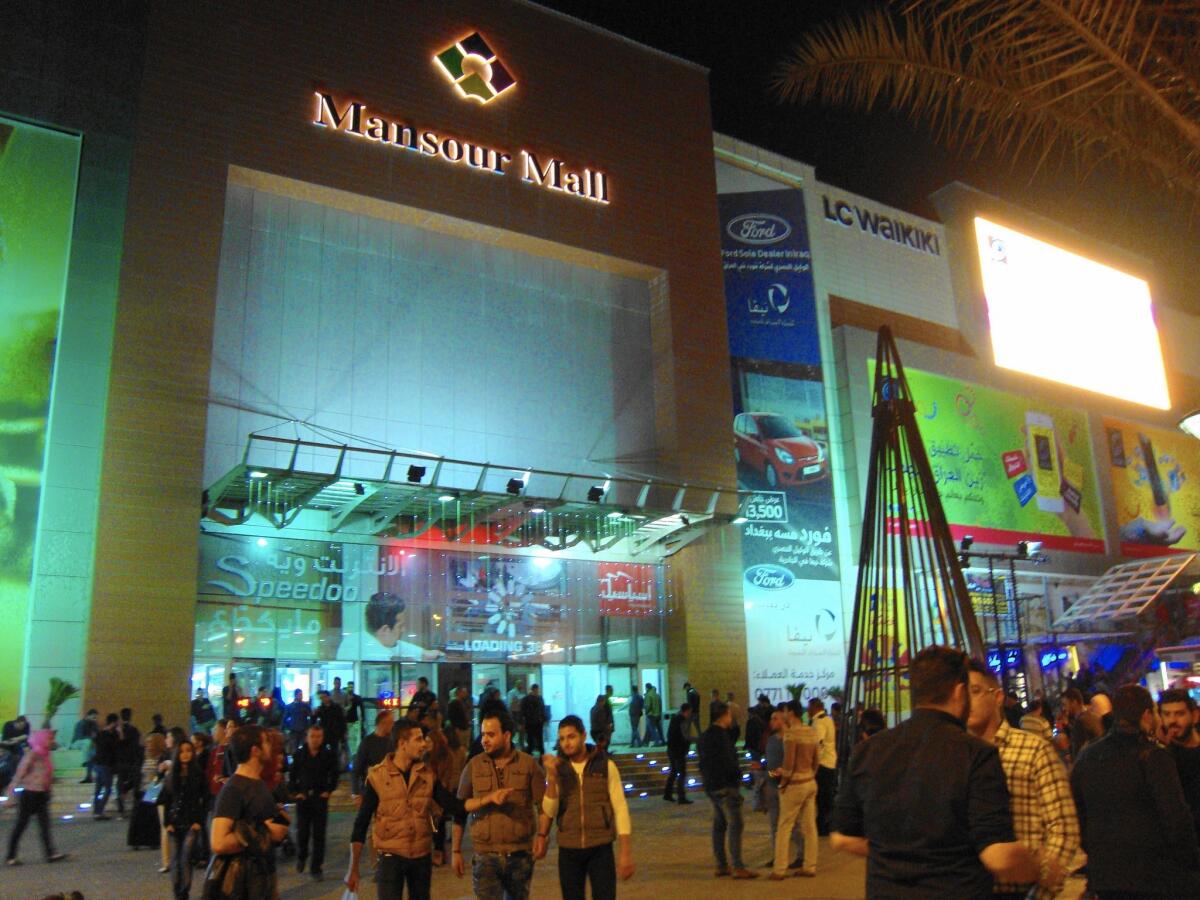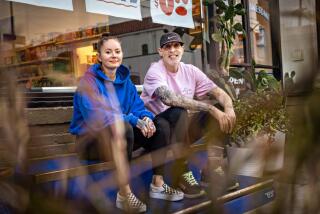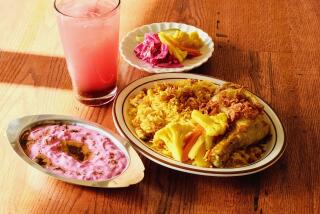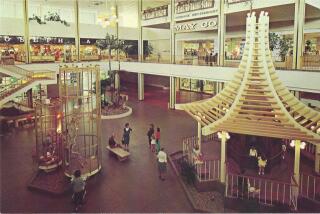Baghdad’s new mall is a haven, and a symbol of an improving economy

Even though much of the capital is out of town for a Shiite religious holiday in the city of Karbala, the gleaming food court at Mansour Mall is packed.
Indoor shopping malls are a staple in neighboring Persian Gulf countries but still rare in war-ravaged Iraq. Customers must file past metal detectors and armed guards in camouflage, and get pat-down checks in separate male and female rooms before reaching off-brand fast food purveyors such as Subz, Pizzarro and Krunchy Fried Chicken.
“This is really our only outlet, our only entertainment,” said Asmaa Janaabi, 53, as she polished off a Turkish coffee while her 15-year-old daughter and a friend enjoyed another Turkish delicacy: kumpir, stuffed baked potatoes.
The $25-million mall, underwritten by Iraqis and built by a Turkish contractor, is in the once wealthy and still aspiring neighborhood from which it takes its name, just three miles from the fortress-like Green Zone, a diplomatic and government area.
Signs affixed to blast walls advertise massive new developments in the neighborhood. The diverse mall crowd on a recent Saturday afternoon seemed in some ways a throwback to the days before the 2003 U.S.-led invasion of Iraq, said Janaabi, a secretary at the Baghdad College for Economic Sciences.
The difference: “These days, even if you’re happy, it’s not like it used to be before 2003. If you’re eating, you’re thinking of refugees.”
Iraq is facing a threat from the Sunni militants of Islamic State. The price of oil is down, with experts predicting the nation’s currency will be devalued and the economy will contract for the first time since 2003.
There’s also the constant threat of car bombings and kidnappings. Street corners are guarded by uniformed Shiite militias. Sectarian tension has increased since the city’s largest mall opened in 2012, Janaabi said, but no one seems to get harassed here.
She and her friend, both Sunnis, wore loose head scarves, gold and gray. Janaabi’s daughter Zabaydah wore her long brown hair loose around her shoulders. Many female mallgoers walk bareheaded, she said, pointing a French manicured finger at a few seated nearby, including a bottle blond. Shops in the mall offer stilettos, ankle-length coats and skinny jeans as well as head scarves and abaya gowns.
“When it first opened, we were worried because there were many people here. We worried that if someone blew up a bomb, there would be a massacre,” Janaabi said. But now her family comes weekly, including her grandchildren.
“You rarely see troublemakers here,” she said.
Janaabi considers the mall expensive but is happy it’s here for impulse buys and its entertainment value. There are movie theaters, a children’s arcade and a mini amusement park at the center of the four-story complex. Her family is eagerly awaiting the impending opening of an even larger mall nearby.
Just that morning, Janaabi had been thinking about the state of security in her hometown. In years past, at the end of the 40-day Arbaeen religious holiday, she was afraid to go out and ended up feeling like a shut-in. Now, she said, she feels safer. But she’s still concerned about security, about her sons with Sunni names being stopped and asked to produce identification by Shiite militiamen.
Some of the young men who frequent the mall, Sunni and Shiite alike, say they plan to leave Baghdad soon in search of safety and jobs. Others see progress and want to stay.
Fahed Saad, 20, sells surveillance cameras and said business is booming. He even helped install the security system at the mall.
His friend Ali Rafedh, leaning against one of the amusement park rides, said Iraq’s economy has clearly been improving. Young men passed with bags bearing synthetic leather coats and V-neck hipster sweaters from trendy shops: Colin’s, the Loft and Timberland. Women tried on shoes at Clarks and snagged clutches at a store named after an unlikely Middle East style inspiration: Paris Hilton.
“Before, most people would come just to watch. Now, they’re buying things,” said Rafedh, 21, who wore skinny jeans, an oversize watch and a button-down shirt bedecked with tiny anchors.
Rafedh, a metallurgy student, comes to the mall weekly to hang out and restock his supply of Dior’s Fahrenheit cologne. After he graduates, he plans to move to Turkey or the Netherlands in search of better-paying jobs.
“Without money, you can’t do anything,” he said as he texted friends on his iPhone.
There are bumper cars, a mini roller coaster and a carousel in the amusement area, which also features a photo attraction where children can pose as sheiks in a Bedouin tent. Children on a whirling ride shout along in Arabic to an Iraqi pop ditty blaring from the speakers: “The Golden Division,” the theme song of a paramilitary group backed by the majority Shiite government.
From behind the counter of the Chocolate convenience store, clerk Yaseen Shwayetch surveyed the crowd, which he said has grown larger in his 15 months on the job as the mall has become better known and its security has improved.
His most popular wares are chocolate bars filled with air bubbles called Bubbly, and Extra Ice gum he imports from London. Like most items on the racks, he sells them at a markup he’s unwilling to pay himself: 1,000 to 2,000 dinars, or $1 to $2.
His gray and black sweatshirt is not from the mall; he has industry connections and refuses to pay retail. When he finds time to be with his friends, he heads for a coffee shop or tearoom, not here.
“Come on! I work here 24 hours a day,” he said. “We have our own places to go.”
Bulos is a special correspondent
More to Read
Start your day right
Sign up for Essential California for news, features and recommendations from the L.A. Times and beyond in your inbox six days a week.
You may occasionally receive promotional content from the Los Angeles Times.







